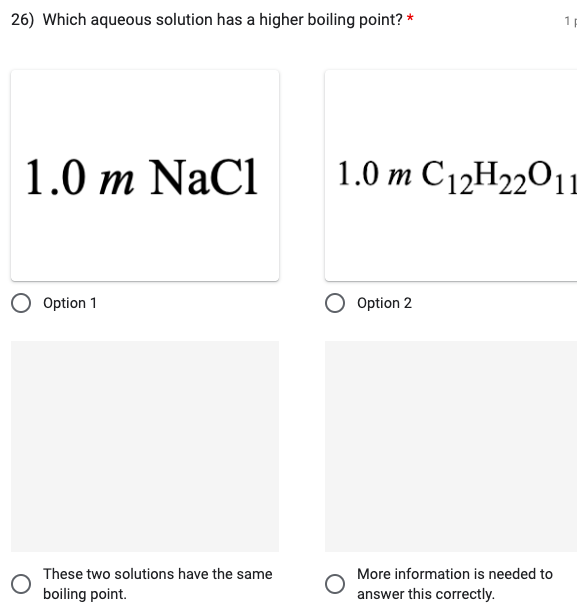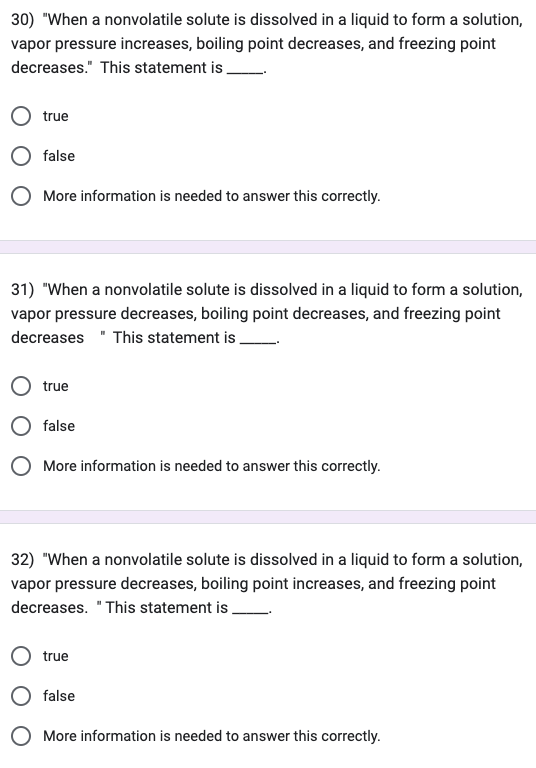31) "When a nonvolatile solute is dissolved in a liquid to form a solution, vapor pressure decreases, boiling point decreases, and freezing point decreases "This statement is. true false More information is needed to answer this correctly. 32) "When a nonvolatile solute is dissolved in a liquid to form a solution, vapor pressure decreases, boiling point increases, and freezing point decreases. "This statement is. true false More information is needed to answer this correctly.
31) "When a nonvolatile solute is dissolved in a liquid to form a solution, vapor pressure decreases, boiling point decreases, and freezing point decreases "This statement is. true false More information is needed to answer this correctly. 32) "When a nonvolatile solute is dissolved in a liquid to form a solution, vapor pressure decreases, boiling point increases, and freezing point decreases. "This statement is. true false More information is needed to answer this correctly.
Chemistry: The Molecular Science
5th Edition
ISBN:9781285199047
Author:John W. Moore, Conrad L. Stanitski
Publisher:John W. Moore, Conrad L. Stanitski
Chapter13: The Chemistry Of Solutes And Solutions
Section: Chapter Questions
Problem 71QRT
Related questions
Question
SUBJECT : GENERAL CHEMISTRY
TOPIC : COLLIGATIVE PROPERTIES

Transcribed Image Text:26) Which aqueous solution has a higher boiling point?
1.0 m NaC1
Option 1
These two solutions have the same
boiling point.
1.0 m C12H22011
Option 2
1 p
More information is needed to
answer this correctly.

Transcribed Image Text:30) "When a nonvolatile solute is dissolved in a liquid to form a solution,
vapor pressure increases, boiling point decreases, and freezing point
decreases." This statement is.
true
false
More information is needed to answer this correctly.
31) "When a nonvolatile solute is dissolved in a liquid to form a solution,
vapor pressure decreases, boiling point decreases, and freezing point
decreases" This statement is.
true
false
O More information is needed to answer this correctly.
32) "When a nonvolatile solute is dissolved in a liquid to form a solution,
vapor pressure decreases, boiling point increases, and freezing point
decreases. "This statement is.
O true
false
O More information is needed to answer this correctly.
Expert Solution
This question has been solved!
Explore an expertly crafted, step-by-step solution for a thorough understanding of key concepts.
Step by step
Solved in 5 steps

Knowledge Booster
Learn more about
Need a deep-dive on the concept behind this application? Look no further. Learn more about this topic, chemistry and related others by exploring similar questions and additional content below.Recommended textbooks for you

Chemistry: The Molecular Science
Chemistry
ISBN:
9781285199047
Author:
John W. Moore, Conrad L. Stanitski
Publisher:
Cengage Learning

General Chemistry - Standalone book (MindTap Cour…
Chemistry
ISBN:
9781305580343
Author:
Steven D. Gammon, Ebbing, Darrell Ebbing, Steven D., Darrell; Gammon, Darrell Ebbing; Steven D. Gammon, Darrell D.; Gammon, Ebbing; Steven D. Gammon; Darrell
Publisher:
Cengage Learning

Chemistry by OpenStax (2015-05-04)
Chemistry
ISBN:
9781938168390
Author:
Klaus Theopold, Richard H Langley, Paul Flowers, William R. Robinson, Mark Blaser
Publisher:
OpenStax

Chemistry: The Molecular Science
Chemistry
ISBN:
9781285199047
Author:
John W. Moore, Conrad L. Stanitski
Publisher:
Cengage Learning

General Chemistry - Standalone book (MindTap Cour…
Chemistry
ISBN:
9781305580343
Author:
Steven D. Gammon, Ebbing, Darrell Ebbing, Steven D., Darrell; Gammon, Darrell Ebbing; Steven D. Gammon, Darrell D.; Gammon, Ebbing; Steven D. Gammon; Darrell
Publisher:
Cengage Learning

Chemistry by OpenStax (2015-05-04)
Chemistry
ISBN:
9781938168390
Author:
Klaus Theopold, Richard H Langley, Paul Flowers, William R. Robinson, Mark Blaser
Publisher:
OpenStax


Chemistry: Principles and Practice
Chemistry
ISBN:
9780534420123
Author:
Daniel L. Reger, Scott R. Goode, David W. Ball, Edward Mercer
Publisher:
Cengage Learning

Chemistry: Principles and Reactions
Chemistry
ISBN:
9781305079373
Author:
William L. Masterton, Cecile N. Hurley
Publisher:
Cengage Learning